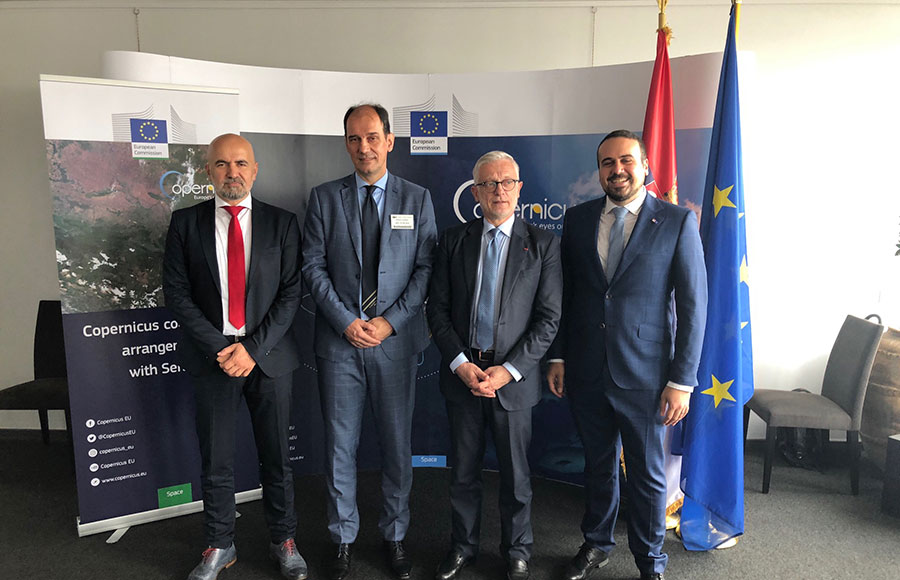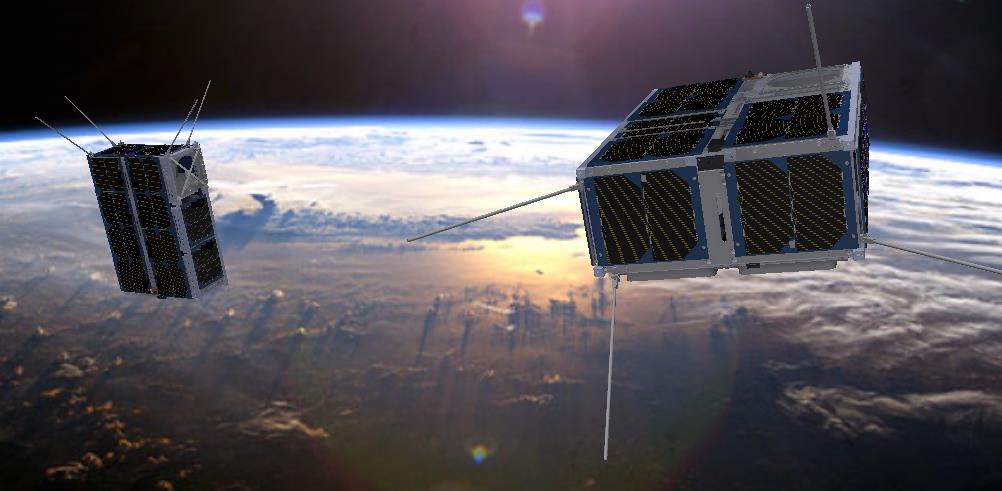The European Commission and the Ministry of Education, Science and Technological Development of the Republic of Serbia established today a partnership on Earth Observation by signing a Copernicus Cooperation Arrangement. It has been signed in Brussels by Philippe BRUNET, Director for Space Policy, Copernicus and Defence, on behalf of the European Commission and by Vladimir POPOVIC, State Secretary at the Ministry of Education, Science and Technological Development on behalf of the Republic of Serbia. The Serbian BioSense Institute – Research and Development Institute for Information Technologies in Biosystems will be the focal point in Serbia for the Copernicus programme in terms of data access and use of Sentinel data.
On the occasion, Sem Fabrizi, the EU Ambassador to Serbia said: “I am very pleased that Serbia has now access to Copernicus – the world’s most ambitious and successful Earth observation programme. Copernicus is a cornerstone of the European Union’s efforts to monitor the Earth and her many ecosystems, whilst ensuring that her citizens are prepared and protected in the face of crises and natural or man-made disasters. Serbian citizens, academics, researchers and private sector will now have access to the data from the family of Copernicus Sentinel satellites using high bandwidth connections. They will join the EU countries in sharing many benefits of the “Copernicus economy”, facilitating a broad range of environmental and security applications, including climate change monitoring, sustainable development, transport and mobility, regional and local planning, maritime surveillance, agriculture and health. We believe that the Copernicus will stimulate Serbian enterprises to explore new growth and business opportunities and foster job creation. As focal point for Serbia for the Copernicus programme, BioSense Institute of Novi Sad – already supported by EU grants through the Horizon 2020 Research and Innovation Programme – will consolidate its leading position as European centre of excellence for advanced technology in sustainable agriculture and food security.”
 Prime Minister Brnabic commented the signature of the agreement: “The signature of the Agreement implies great recognition of Serbia’s EU integration efforts. Also, this is a great recognition for the BioSense Institute. It confirms BioSense’s leading position in the area of digital agriculture in this part of Europe and beyond. By winning the first place under the prestigious call within Horizon 2020, the Institute has proven that Serbia has the knowledge and potential as well as the creative and innovative capacity that put it on par with more developed countries. This Agreement will bring us closer to the European Union in the area of science, digitization and agriculture. I am happy that our citizens will from now on have access to these unique data that will bring substantial benefits, first to our farmers, and then to many other areas of the innovation business.“
Prime Minister Brnabic commented the signature of the agreement: “The signature of the Agreement implies great recognition of Serbia’s EU integration efforts. Also, this is a great recognition for the BioSense Institute. It confirms BioSense’s leading position in the area of digital agriculture in this part of Europe and beyond. By winning the first place under the prestigious call within Horizon 2020, the Institute has proven that Serbia has the knowledge and potential as well as the creative and innovative capacity that put it on par with more developed countries. This Agreement will bring us closer to the European Union in the area of science, digitization and agriculture. I am happy that our citizens will from now on have access to these unique data that will bring substantial benefits, first to our farmers, and then to many other areas of the innovation business.“
Copernicus is the European Union’s revolutionary Earth Observation and Monitoring programme, looking at our planet and its environment for the ultimate benefit of all European citizens. Thanks to a variety of technologies, from satellites in space to measurement systems on the ground, in the sea and in the air, Copernicus delivers operational data and information services openly and freely in a wide range of application areas. In partnership with the EU Member States, the European Commission oversees and coordinates the programme and ensures that it remains user-driven.
The Cooperation Arrangement establishes the Serbian BioSense Institute – Research and Development Institute for Information Technologies in Biosystems (hereinafter referred to as “BioSense Institute”) as the focal point in Serbia for the Copernicus programme in terms of data access and use of Sentinel data. BioSense is already leading the EU-funded project Antares, which aims to turn BioSense into the European centre of excellence for advanced technology in sustainable agriculture and food security. Antares has a budget of 28 million euros, out of which 14 million is a EU grant and 14 million is national co-financing provided by the Government of the Republic of Serbia.




